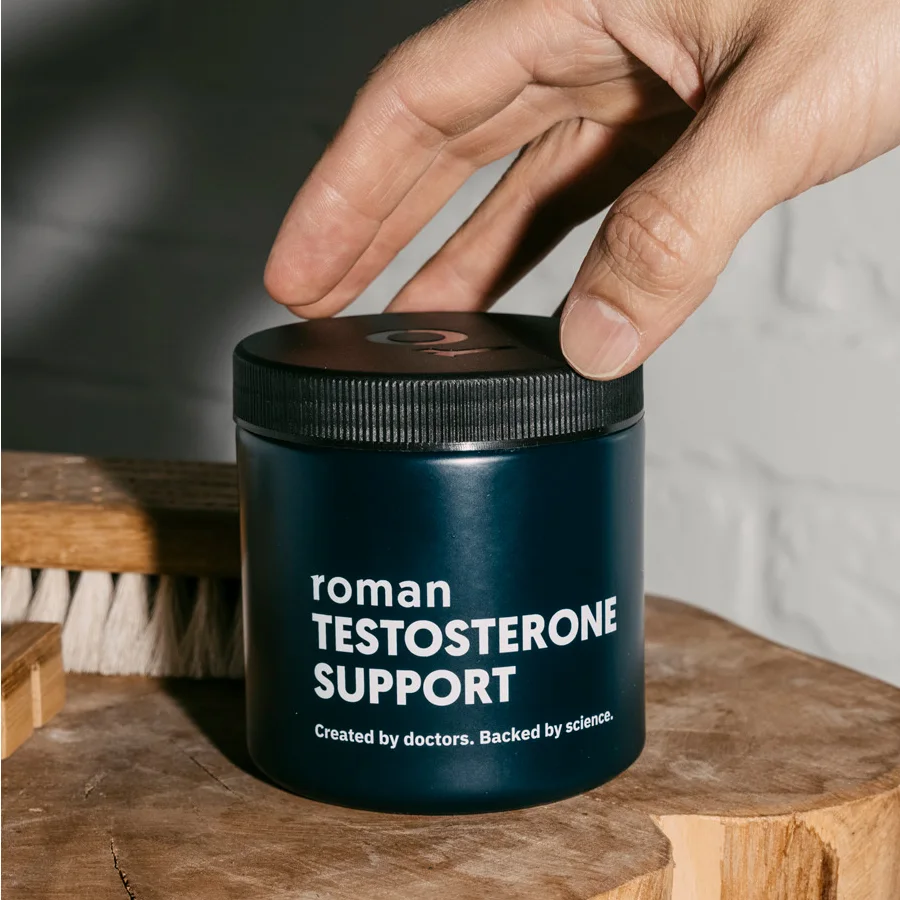Here's what we'll cover
Here's what we'll cover
Although extremely treatable, “low T” (low testosterone) has gained quite a bit of notoriety—if you’ve experienced this much-talked-about condition, you might know that low T can result in some unwanted symptoms, like fatigue, weight gain, low sex drive, and more. Thankfully, many safe and effective treatment options are available to treat low testosterone, including Depo-Testosterone.
What is Depo-Testosterone?
Depo-Testosterone is an injectable form of testosterone (T) that’s available by prescription only and manufactured by Pfizer. It's also available as a generic: testosterone cypionate. Testosterone therapy (which raises T levels to the “normal” range for biological adult men, trans men, and nonbinary people) can be beneficial for patients with a few different conditions.
Testosterone cypionate is a so-called “depot” injectable. As a depot form of T, Depo-Testosterone has a longer half-life than other forms of T available (like testosterone propionate).
Half-life measures the amount of time it takes for a drug to leave your body. When the half-life of a drug is long, it has a longer time to work in the body.
Testosterone is a “male” sex hormone—or androgen—that’s known to play a role in sexual health and the development of masculine sex characteristics at puberty. But, T is an essential hormone in all people throughout life.
There’s more than meets the eye when it comes to testosterone, as having low levels can lead to symptoms and health risks, including:
Depression and mood disorders
Changes in cholesterol, muscle, and fat distribution
Conditions of the blood, like anemia
Loss of bone mineral density and lowered bone strength
Sexual dysfunction (loss of sex drive, erectile dysfunction)
Who should take testosterone?
Depo-Testosterone is beneficial for those who experience two primary conditions: hypogonadism and gender dysphoria.
Hypogonadism
Low T, otherwise known as hypogonadism, can lead to symptoms that can significantly impact your life. Some forms of hypogonadism are genetic, and others can be acquired during life as a result of other factors, including:
HIV
Certain medications
Aging
Certain types of cancer
Developing low T can lead to breast discomfort, loss of body hair, and decreased sex drive. T therapy is often prescribed to people with low T symptoms who are not at high risk for side effects.
How does Depo-Testosterone help with these symptoms? Researchers set out to answer that question in a set of trials known as the T-trials. Researchers compared injecting T with a placebo in over 700 men who had hypogonadism. Restoring testosterone levels was found to have hefty benefits in these clinical trials, including improvements to the following:
Sexual function
Mood and depression
Bone mineral density
The trial also reported higher risks in older patients or those with a predisposition for heart problems. For this reason, testosterone replacement therapy is not FDA-approved in patients who have low T due to aging, though it is often used off-label in these cases.
Gender dysphoria
Depo-Testosterone also has clinical benefits in treating gender dysphoria (which can lead to severe depression and generalized anxiety) experienced by trans and nonbinary people. It’s mainly prescribed for trans men and nonbinary people who desire masculinization, but it may also help alleviate anxiety and social distress.
Depo-Testosterone can lead to gender-affirming physical changes in men who were assigned female at birth (AFAB). In scientific research, these changes are dubbed "virilization” and include:
Deepening of the voice
Increased hair growth on the body
Increased development and changes in the distribution of muscle
People who take T generally notice changes within one month of starting therapy but will usually see significant results after about three months of taking testosterone therapy.
Depo-Testosterone vs. other forms of T
As mentioned, Depo-Testosterone is a long-acting injection. But there are several other forms of T therapy available by prescription, including:
Testosterone undecanoate, taken by mouth (brand name Jatenzo)
Testosterone enanthate, taken by injection (brand name Delatestryl)
Testosterone nasal gel, applied to the nose (brand name Natesto)
Testosterone topical gel, applied to the skin (brand names Androgel, Fortesta, and Testim)
All of the prescription drugs mentioned above are proven to be safe and effective forms of testosterone therapy. However, there are differences in how these forms of T are taken, so pay extra attention to the directions for use on your prescription and carefully follow your healthcare provider’s advice.
Depo-Testosterone should be stored at room temperature to avoid solids from forming in the bottle. If this happens, you can use the warmth from the palms of your hands and roll the bottle until the hardened crystals disappear.
Who should avoid taking T?
Older patients suffering from medical conditions like heart failure or uncontrolled high blood pressure potentially have a greater risk of experiencing severe side effects from taking testosterone. Although research is varied, the FDA has issued an official safety notification requiring drug manufacturers to reflect the risk of heart attacks and other heart problems on T-containing product labels.
People living with severe kidney disease or liver disease should not take testosterone, as the risks can be high with long-term therapy. T is also unsafe to use in patients with breast cancer, prostate cancer, and certain blood conditions (specifically, polycythemia).
Side effects of Depo-Testosterone
Severe allergic reactions to the contents of Depo-Testosterone have been reported. If after taking your first dose, you experience any symptoms of an allergy (hives, swelling, trouble breathing), do not take your second dose and seek immediate medical care.
Testosterone has the potential for abuse, and because of this, it’s a schedule III controlled substance. Taking higher doses of T than prescribed or combining it with the use of anabolic steroids can lead to severe and life-threatening adverse events.
T can come with some side effects, but for many people, the benefits often outweigh the risks. Some possible adverse effects of T include:
Acne and changes in the skin
Pain at the site of injection, itchiness
Gynecomastia (enlargement of the breasts)
Headaches
High blood pressure (hypertension)
Increased red blood cell counts
If you take other medications and are considering depo-testosterone, talk to your healthcare provider about all of the medications you take. T can have drug interactions with other medications—namely, blood thinners (like warfarin) and anabolic steroids. Combining T with anticoagulants like warfarin may increase your risk of bleeding.
If you experience undesirable symptoms of low T, you’re not alone. Low T is treatable, and whether you struggle with hypogonadism or gender dysphoria, your healthcare provider can help determine a safe and effective treatment plan that’s right for you.
DISCLAIMER
If you have any medical questions or concerns, please talk to your healthcare provider. The articles on Health Guide are underpinned by peer-reviewed research and information drawn from medical societies and governmental agencies. However, they are not a substitute for professional medical advice, diagnosis, or treatment.
Aykan, D. A. & Aykan, A. C. (2021). The interaction of drugs to treat cardiovascular diseases and testosterone therapy, their effects, and characteristics. Journal of Men's Health , 17 (2), 25-31. doi:10.31083/jomh.2021.005. Retrieved from https://www.jomh.org/articles/10.31083/jomh.2021.005
Elagizi, A., Köhler, T. S., & Lavie, C. J. (2018). Testosterone and cardiovascular health. Mayo Clinic Proceedings , 93 (1), 83–100. doi: 10.1016/j.mayocp.2017.11.006. Retrieved from https://pubmed.ncbi.nlm.nih.gov/29275030/
Gava, G., Mancini, I., Cerpolini, S., et al. (2018). Testosterone undecanoate and testosterone enanthate injections are both effective and safe in transmen over 5 years of administration. Clinical Endocrinology , 89 (6), 878–886. doi: 10.1111/cen.13821. Retrieved from https://pubmed.ncbi.nlm.nih.gov/30025172/
Ganesan, K., Rahman, S., & Zito, P. M. (2022). Anabolic steroids. StatPearls . Retrieved on Mar. 8, 2023 from https://www.ncbi.nlm.nih.gov/books/NBK482418/
Hembree, W. C., Cohen-Kettenis, P. T., Gooren, L., et al. (2017). Endocrine treatment of gender-dysphoric/gender-incongruent persons: an endocrine society clinical practice guideline. The Journal of Clinical Endocrinology and Metabolism , 102 (11), 3869–3903. doi: 10.1210/jc.2017-01658. Retrieved from https://pubmed.ncbi.nlm.nih.gov/28945902/
Mulhall, J. P., Trost, L. W., Brannigan, R. E., et al. (2018). Evaluation and management of testosterone deficiency: AUA guideline. The Journal of Urology , 200 (2), 423–432. doi: 10.1016/j.juro.2018.03.115. Retrieved from https://pubmed.ncbi.nlm.nih.gov/29601923/
Nassar, G. N. & Leslie, S. W. (2022). Physiology, testosterone. StatPearls . Retrieved on Mar. 8, 2023 from https://pubmed.ncbi.nlm.nih.gov/30252384/
Petering, R. C. & Brooks, N. A. (2017). Testosterone therapy: review of clinical applications. American Family Physician , 96 (7), 441–449. Retrieved from https://pubmed.ncbi.nlm.nih.gov/29094914/
Rey, R. A. & Grinspon, R. P. (2020). Androgen treatment in adolescent males with hypogonadism. American Journal of Men's Health, 14 (3), 1557988320922443. doi:10.1177/1557988320922443. Retrieved from https://www.ncbi.nlm.nih.gov/pmc/articles/PMC7249582/
Saad, F., Röhrig, G., von Haehling, S., et al. (2017). Testosterone deficiency and testosterone treatment in older men. Gerontology , 63 (2), 144–156. doi: 10.1159/000452499. Retrieved from https://pubmed.ncbi.nlm.nih.gov/27855417/
Snyder, P. J., Bhasin, S., Cunningham, G. R., et al. (2018). Lessons from the testosterone trials. Endocrine Reviews , 39 (3), 369–386. doi: 10.1210/er.2017-00234. Retrieved from https://pubmed.ncbi.nlm.nih.gov/29522088/
Unger, C. A. (2016). Hormone therapy for transgender patients. Translational Andrology and Urology , 5 (6), 877–884. doi: 10.21037/tau.2016.09.04. Retrieved from https://pubmed.ncbi.nlm.nih.gov/28078219/
U. S. Food and Drug Administration (FDA). (2018). FDA Drug Safety Communication: FDA cautions about using testosterone products for low testosterone due to aging; requires labeling change to inform of possible increased risk of heart attack and stroke with use. Retrieved Mar. 8, 2023 from https://www.fda.gov/drugs/drug-safety-and-availability/fda-drug-safety-communication-fda-cautions-about-using-testosterone-products-low-testosterone-due










